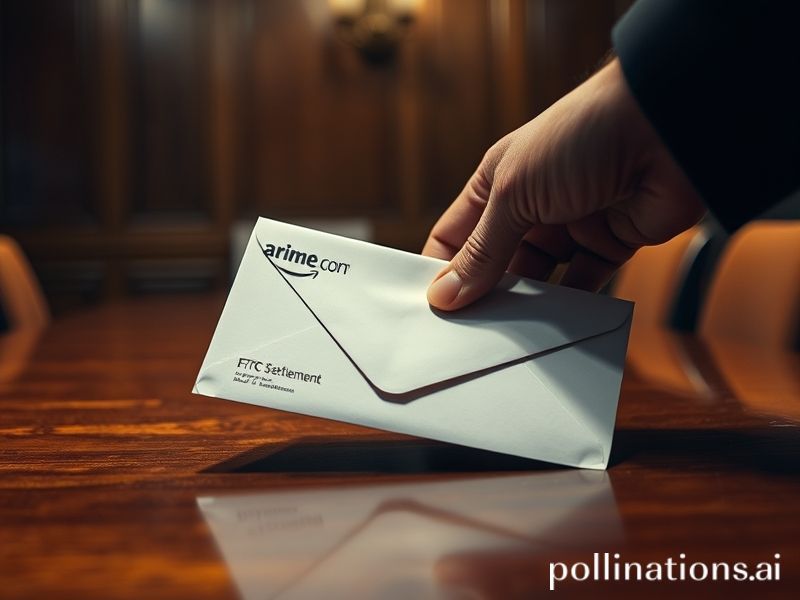Global Schadenfreude as Amazon Pays $25M to Un-Subscribe the Planet
BREAKING: Amazon to Reimburse the Planet for the Privilege of Accidentally Subscribing to Itself
A Dispatch from the Bureau of “Wait, I Never Ordered This Dystopia”
By the time you finish reading this sentence, six more people in six different time zones will have discovered a mysterious $14.99 charge on their credit-card statement labeled “Prime.” One will be in São Paulo, another in Lagos, a third in Helsinki, the fourth in Manila, the fifth in Toronto, and—because irony is now a global commodity—the sixth will be an Amazon employee in Seattle who thought he’d cancelled the free trial back when Netflix still mailed DVDs. Welcome to the FTC’s latest masterpiece of late-capitalist performance art: a $25 million settlement for Amazon’s allegedly “dark-pattern” enrollment tactics. The refund pool is planetary; the schadenfreude is artisanal.
The U.S. Federal Trade Commission, in a rare burst of regulatory cardio, accused Amazon of designing its checkout flow like a fun-house mirror maze where the only exit signs read “BUY NOW.” Non-consensual Prime subscriptions, labyrinthine cancellation menus, and that cheerful orange-and-blue color palette—perfect for hypnotising anyone who’s ever clicked “Add to Cart” at 2 a.m.—were apparently not bugs but features. Amazon, naturally, admitted no wrongdoing, which is corporate-speak for “we’re guilty as sin, but the stock price is doing yoga today, so let’s not spook it.”
International context? Picture the United States as that one friend who finally shows up to the intervention with a half-eaten cake and an apology note. The rest of the world has been watching American tech giants export subscription traps the way France exports champagne—only the hangover is mandatory. From Berlin to Bengaluru, regulators have long suspected that Silicon Valley’s business model is essentially a planetary claw machine rigged to drop plushies labeled “recurring payments” on anyone who blinks too slowly. The FTC’s action is therefore less an isolated wrist-slap and more a belated RSVP to a party already raging on five continents.
Consider the numbers. Roughly 35 percent of global e-commerce flows through Amazon. If even a modest slice of those transactions involve a sneaky Prime opt-in, the aggregate overcharge starts to look like the GDP of a midsize Baltic nation. The FTC’s refund scheme—automatic credits, mailed checks, carrier pigeons if necessary—will touch consumers in 170 countries, proving once again that the fastest way to unite humanity is to accidentally pick its pockets en masse and then apologize with interest.
Meanwhile, Brussels is taking notes. The EU’s Digital Services Act, already the legislative equivalent of a disapproving Belgian uncle, is sharpening its claws for similar dark-pattern raids. South Korea’s Personal Information Protection Commission, fresh off fining Google and Meta enough won to fund a modest K-pop comeback, is eyeing subscription flows like a hawk that’s read Kafka. And in Australia, the ACCC has begun muttering the phrase “unfair contract terms” with the same tone bartenders reserve for “last call.” In short, Amazon’s settlement is less a finale and more the opening act of a world tour titled “Oops, Did We Monetise Your Inattention Again?”
Human nature, bless its gullible little heart, remains gloriously consistent. We’ll click “Yes” to anything if the button is big enough and the font is cheerful. The global takeaway here isn’t just that Amazon nudged us into loyalty; it’s that we collectively nodded along while polishing our phones like modern-day worry beads. The refund, when it arrives, will buy one artisanal coffee in Oslo or half a metro ticket in Tokyo—just enough to remind us we once paid for faster shipping on a toothbrush at 3 a.m.
So toast the FTC for its rare display of vertebral activity. Savor the irony that the same algorithmic nudges used to sell you a banana slicer are now being retroactively monetised to fund your next impulse buy. And remember: somewhere in Luxembourg, an Amazon tax lawyer is updating an Excel sheet titled “Miscellaneous Contingencies – LOL.” The settlement may be $25 million, but the lesson, dear reader, is priceless: in the global marketplace, the house always primes.







